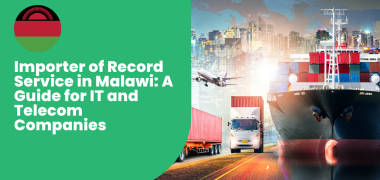Malawi, a landlocked country in Southeast Africa, is characterized by its diverse landscapes and growing economy. With its strategic position bordering Zambia, Tanzania, and Mozambique, Malawi has become an essential player in regional trade. However, navigating the complexities of import regulations in Malawi can be challenging for businesses. This is where the Importer of Record (IOR) service comes into play. This article explores the significance, functions, and benefits of the IOR service in Malawi, and how businesses can effectively utilize this service to streamline their import operations.
Understanding the Importer of Record (IOR)
An Importer of Record is a legal entity responsible for ensuring that goods imported into a country comply with all local laws and regulations. This includes handling all necessary documentation, paying relevant duties and taxes, and ensuring that the goods meet the country’s standards. In Malawi, the IOR service is particularly crucial for businesses that do not have a local presence but wish to import goods into the country.
The Role of an Importer of Record in Malawi
The IOR in Malawi plays a pivotal role in facilitating seamless importation processes. The responsibilities of an IOR include:
- Customs Clearance: Ensuring all goods pass through Malawian customs smoothly by preparing and submitting the necessary documentation.
- Compliance: Adhering to Malawian import regulations, which can include sanitary and phytosanitary measures, product standards, and other regulatory requirements.
- Payment of Duties and Taxes: Calculating and paying any import duties, taxes, and other fees associated with bringing goods into Malawi.
- Record Keeping: Maintaining detailed records of all import transactions as required by Malawian law.
- Risk Management: Managing and mitigating risks associated with the importation process, including potential legal and financial liabilities.
Benefits of Using an IOR Service in Malawi
- Expertise and Knowledge: An IOR has specialized knowledge of Malawi’s import regulations, ensuring compliance and reducing the risk of costly errors.
- Time and Cost Efficiency: By handling all import-related tasks, an IOR can save businesses time and reduce operational costs.
- Focus on Core Business: Businesses can concentrate on their primary operations without worrying about the complexities of the import process.
- Local Representation: For companies without a physical presence in Malawi, an IOR acts as a local representative, facilitating smoother transactions.
- Risk Reduction: By ensuring compliance with local laws, an IOR minimizes the risk of legal issues, penalties, and delays.
Key Considerations When Choosing an IOR Service in Malawi
When selecting an IOR service provider in Malawi, businesses should consider the following factors:
- Reputation and Experience: Choose a provider with a proven track record and extensive experience in handling imports into Malawi.
- Comprehensive Services: Ensure the IOR offers a full range of services, from customs clearance to compliance and record-keeping.
- Local Knowledge: The provider should have in-depth knowledge of Malawi’s specific import regulations and procedures.
- Cost Structure: Understand the cost structure of the IOR service, including any hidden fees or additional charges.
- Customer Support: Opt for a provider that offers excellent customer support and is responsive to queries and concerns.
The Import Process in Malawi
- Pre-Import Preparations: Before importing goods into Malawi, it is essential to understand the specific requirements for the products being imported. This includes identifying any necessary licenses, permits, and certifications.
- Documentation: Accurate and complete documentation is crucial. Commonly required documents include the commercial invoice, bill of lading, packing list, and certificates of origin.
- Customs Declarations: The IOR will prepare and submit customs declarations, ensuring all information is accurate and complies with Malawian regulations.
- Duties and Taxes: Import duties and taxes must be calculated and paid. The IOR ensures that these are paid on time to avoid any delays in the clearance process.
- Inspections and Compliance: Malawian authorities may conduct inspections to verify that the goods meet the required standards. The IOR coordinates these inspections and ensures compliance.
- Release and Delivery: Once cleared, the goods are released from customs and can be delivered to the final destination.
Challenges in the Import Process
Despite the benefits, there are several challenges associated with the import process in Malawi:
- Regulatory Changes: Import regulations in Malawi can change frequently, making it challenging to stay compliant.
- Bureaucracy: The import process can involve significant bureaucratic hurdles, leading to delays and increased costs.
- Logistical Issues: Malawi’s landlocked position and infrastructure can pose logistical challenges, particularly in remote areas.
- Language Barrier: For foreign businesses, the language barrier can complicate communication with local authorities and stakeholders.
Case Studies: Successful IOR Implementations in Malawi
To illustrate the effectiveness of IOR services, consider the following case studies:
- Agricultural Equipment Supplier: A European company specializing in agricultural equipment wanted to import machinery into Malawi to support local farmers. Without a local presence, they engaged an IOR service. The IOR managed all import documentation, customs clearance, and compliance with Malawian regulations, enabling the equipment to reach farmers without delay. This helped improve agricultural productivity and strengthened the company’s presence in the region.
- Pharmaceutical Distributor: A global pharmaceutical firm needed to import medical supplies into Malawi to distribute to healthcare facilities. By utilizing an IOR, they ensured that all products met Malawian health standards, avoided delays at customs, and facilitated swift delivery to hospitals and clinics. This timely distribution was crucial for maintaining the supply of essential medicines and improving healthcare outcomes.
Future Trends and Developments
The role of IOR services in Malawi is likely to evolve with the changing business landscape. Key trends and developments to watch include:
- Digitalization: The adoption of digital technologies in customs and import processes can streamline operations and reduce paperwork.
- Regulatory Harmonization: Efforts to harmonize import regulations with international standards may simplify compliance for foreign businesses.
- Infrastructure Improvements: Ongoing infrastructure projects in Malawi can alleviate logistical challenges, making it easier to import goods.
- Environmental Regulations: Increasing focus on environmental sustainability may lead to new regulations impacting the import process, necessitating specialized IOR services.
Conclusion
The Importer of Record service in Malawi is a vital component for businesses seeking to navigate the complex import regulations and logistical challenges in the country. By leveraging the expertise and local knowledge of an IOR, companies can ensure compliance, reduce risks, and focus on their core business activities. As Malawi continues to grow as a hub for regional trade, the demand for efficient and reliable IOR services is expected to increase, making it an essential element of successful business operations in the region. Whether you are an agricultural equipment supplier or a pharmaceutical distributor, utilizing an IOR service in Malawi can significantly enhance your ability to operate smoothly and effectively in this promising market.




